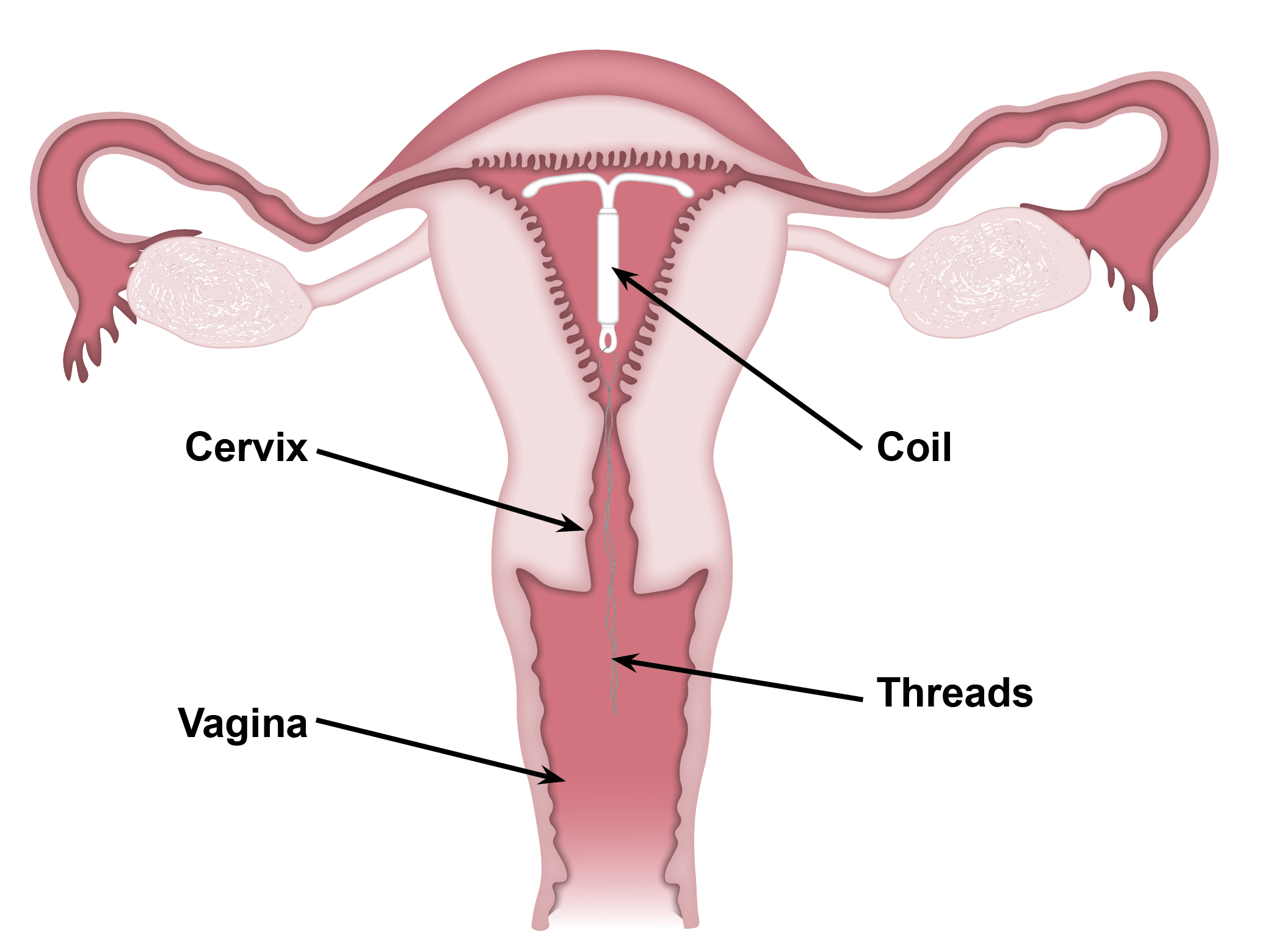Mirena coil
Information for patients from Women's Health
This leaflet is for women who are considering having a Mirena coil fitted. The leaflet explains:
what a Mirena coil is
how it can help you
how the coil is fitted and removed, and
what the possible complications and side effects are.
If after reading this leaflet you have any questions, please speak to your doctor or nurse.
What is the Mirena coil?

The Mirena coil is an effective, long-term, and reversible method of contraception. It also has the benefit of dramatically reducing menstrual (blood) loss in most women, so it can be used as a treatment for heavy periods.
It consists of a small, plastic T-shaped frame which is inserted into the womb. This carries the hormone (progestogen) in a sleeve around its stem, and has two fine threads attached to the base.
How effective is it?
As a method of contraception, it is very reliable. The failure rate is one in 1000 (female sterilisation failure rate is one in 200). You will be protected from pregnancy as soon as the device is fitted.
What happens to my periods?
For the first three to six months after the coil is fitted:
many women have spotting or light bleeding, as well as their periods, and
some women have heavy or prolonged bleeding.
Usually after the fifth month, most women notice their periods become much less heavy and frequent. About four in 10 women stop having periods altogether after the first year of use.
One study showed that two in three women waiting for a hysterectomy for heavy periods, who were fitted with a Mirena coil, cancelled their surgery because they were satisfied with the treatment.
Can any woman use it?
Most women can use the Mirena coil but it will not be suitable for everyone.
You can use the coil as a contraceptive and / or a treatment for heavy periods, so fertile women can use it. You can also have a coil fitted if you have been sterilised.
How long does it work?
If you are using the Mirena coil as a contraceptive, it will work for eight years. If you are using the coil for other reasons, it works for five years.
How is it fitted?
A doctor or trained nurse will fit the coil in your womb through your vagina. Most women find this causes only a little discomfort. Some cramping may follow for a few hours.
Your GP or a Family Planning Clinic can fit the coil.
When is it fitted?
It is usually fitted during your period or within seven days of the start of it.
It can also be fitted six weeks after giving birth, or immediately after a miscarriage or termination of pregnancy.
A surgeon can fit a Mirena coil during a caesarean birth. For more information, please read the Trust's leaflet Contraceptive coil insertion at the time of caesarean birth.
How long does the fitting take?
Preparing for the procedure takes about five minutes. The actual fitting only takes a few seconds.
Can I change my mind?
Yes. You can ask your GP practice to remove the device at any time. The removal is easy and you do not need to return to the hospital for this.
When we remove the device, your usual level of fertility will return very quickly. If you are not planning a baby, it is important to use another method of contraception in the two weeks leading up to its removal, otherwise you could get pregnant.
Can I become pregnant with the system in place?
It is very rare for a woman to become pregnant whilst using the device. There have been no pregnancies in women using the device who do not have periods.
Can it get dislodged or fall out?
This is unlikely, but it can happen. If the device comes out either completely or partially, you are not protected against pregnancy.
Signs that this has happened include:
an increase in the amount of bleeding during your period, or
the return of your periods (if the coil insertion had stopped your periods).
If you think it has come out, use another reliable method of contraception until you can see your doctor or nurse.
How can I check to see if it is in place?
After each period or once a month, you can feel for the two fine threads that pass from the device through the cervix into your vagina. Tell your doctor if you cannot feel them or if you or your partner feels any discomfort during sex. Your doctor or nurse can adjust the threads, if necessary.
Will I put on weight?
The Mirena coil should not cause any change in your weight.
Are there any side effects?
If you have a coil fitted, your hormone levels will be much lower than if you were taking the pill. Because of this, side effects (such as tender breasts, headaches, and acne) are less likely. If they occur they usually settle within a few months.
What about other complications?
The Mirena coil should not increase your risk of pelvic infection or ectopic pregnancy. If you have any questions or concerns, please ask your doctor or nurse.
We have used the term ‘women’ throughout this leaflet. When we use this term we also mean people with female reproductive organs who do not identify as a woman. East Kent Hospitals is committed to supporting people of all gender identities. Please tell your nurse, midwife or doctor how you would like them to address you, so we can be sure to get this right.